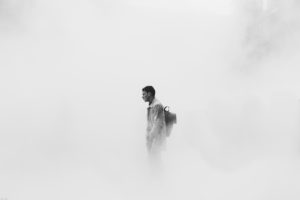With all the stress people face nowadays, it can be difficult at times to figure out if a person is just overly stressed or if there is something more to their mood swings.
 Unfortunately, because of the stigma attached to mental health, many choose not to investigate further, simply hoping for the best. However, many mental disorders do occur to a lot of people in this world, even those who are not dealing with major stressors in life.
Unfortunately, because of the stigma attached to mental health, many choose not to investigate further, simply hoping for the best. However, many mental disorders do occur to a lot of people in this world, even those who are not dealing with major stressors in life.
Bipolar disorder is one such mental issue that many unsuspecting people deal with on their own, not knowing that reliable, professional help exists. So instead of living the life God intended them to have, they struggle through it, dealing with their ever-shifting moods and the subsequent effects on their family and career. Santa Monica Christian Counseling offers compassionate, faith-based support to help individuals manage bipolar disorder and regain balance in their lives.
Signs of Bipolar Disorder
Though everybody has good and bad days, the level of change is nowhere near that of someone with bipolar disorder. Sufferers of this mental issue experience extremes highs and lows, greatly affecting how they think and behave. In some cases, sufferers may even experience psychosis (hallucinations, delusions, or paranoia) which can be quite scary for both the sufferer and the people around them.
Researchers have still not found an exact cause to it, though much research has been done. It has been proven to run in families. Regardless of how it is caused, bipolar disorder exists and causes problems for those suffering from it.
The Two Kinds: Bipolar I and Bipolar II
There are two types of bipolar disorder: Bipolar I and Bipolar II. They are considered separate diagnoses, with Bipolar I considered to be more dangerous.
 As the more serious form, sufferers of Bipolar I have experienced at least one manic episode along with other instances of major depressive or hypomanic episodes. In some cases, psychosis may also have occurred. With Bipolar II, the sufferer has experienced a minimum of one hypomanic episode and one major depressive episode, but no manic episode.
As the more serious form, sufferers of Bipolar I have experienced at least one manic episode along with other instances of major depressive or hypomanic episodes. In some cases, psychosis may also have occurred. With Bipolar II, the sufferer has experienced a minimum of one hypomanic episode and one major depressive episode, but no manic episode.
Mania Versus Hypomania
When their mood is “high,” sufferers of both types have higher energy levels than normal, causing them to have some of the following symptoms: restlessness, decreased need for sleep, lack of focus, racing thoughts, need to talk a lot, feelings of grandiosity, or a higher sex drive.
Additionally, during this “happy time” for them, sufferers may engage in very risky behavior such as wanton gambling, promiscuity, substance abuse, or other extreme activities. They also may begin multiple projects or agree to multiple commitments, thinking they can finish them all, only to end up with nothing.
As mentioned earlier, Bipolar I is more serious than Bipolar II as the manic episodes experienced by the former last longer (weeks for Bipolar I versus just days for Bipolar II) and may be more extreme, endangering themselves or others.
Those with Bipolar I also have a high risk of delusional behavior (e.g. – thinking they can fly), hallucinations, or paranoia that may also cause great harm. Sometimes hospitalization is required to bring them back to reality (if they are not already hospitalized for something done).
Major Depressive Episodes
When their mood is “low,” both types feel very depressed as they have very low energy levels. Other signs of bipolar disorder include constant fatigue, a change in sleep patterns (excessive or lack of sleep), a change in eating habits (too much or too little), difficulty concentrating, feelings of emptiness, difficulty concentrating, forgetfulness, a change in appetite (decrease or increase), feelings of worry and emptiness, or suicidal thoughts.
 If recklessness is the big danger during manic or hypomanic episodes, suicide is a very real issue during the major depressive ones, with many sufferers having attempted it at least once. Between the two types, Bipolar II usually has longer major depressive episodes than those with Bipolar I.
If recklessness is the big danger during manic or hypomanic episodes, suicide is a very real issue during the major depressive ones, with many sufferers having attempted it at least once. Between the two types, Bipolar II usually has longer major depressive episodes than those with Bipolar I.
Proper Diagnosis
As in many other health issues, proper diagnosis is necessary to get the right help. Unfortunately, sometimes people may be misdiagnosed as many of the signs of bipolar disorder can also be found in other mental disorders such as major depression, ADHD, and others.
Not only that, there are also some disorders closely related to bipolar disorders I and II, such as Cyclothymic disorder and Bipolar NOS, which are both milder in form, yet troublesome nonetheless.
Self-awareness, insights from loved ones, and the right therapist are important so that a person may receive the help they need.
Treatment Available for Bipolar Disorder
Treatment for bipolar disorder is not something that can be done without professional help. Fortunately, when help is found, there are many treatments available.
Medication Management
Medications (e.g. anti-depressants, anti-psychotics, mood stabilizers) do exist to help with the imbalances. It is important, however, to find a doctor who has a specialty in psychiatry so that the right medication is given.
Therapy Options
 When taking medication, the sufferer should also undergo either Cognitive Behavioral Therapy (CBT) or Dialectical Behavior Therapy (DBT) to help adjust how they think. Both are quite similar as they seek to change the sufferer’s negative mentality to a positive one.
When taking medication, the sufferer should also undergo either Cognitive Behavioral Therapy (CBT) or Dialectical Behavior Therapy (DBT) to help adjust how they think. Both are quite similar as they seek to change the sufferer’s negative mentality to a positive one.
Group therapy is also very helpful. Knowing that one is not alone in the struggle can really boost a person’s confidence, especially if successful stories are shared.
Other Options
In case medication does not work, there are other procedures available that use the latest technology. But it is best to consult with a doctor or therapist first before opting for such.
Seeking Help through Christian Counseling
Bipolar disorder is a very debilitating mental issue to have, but it can be managed with help. The right medication can limit the manic and depressive moods so that the sufferer is in control. Therapy will give the sufferer a stronger mindset and allow the person to view their circumstances in a more positive light.
Now while secular therapists can be of help, in Christian counseling, assistance is taken one step further. In addition to the sound counseling methods to help process negative thoughts, the Christian counselor will help connect the Bipolar sufferer to our Lord, Jesus Christ, through prayer and meditation on Scripture.
It is only through a strong relationship with our Lord that the sufferer will be able to find inner peace, especially if the person has been bombarded with feelings of guilt or self-hate, or thoughts of suicide. A Christian counselor at Santa Monica Christian Counseling can provide this faith-based support and guidance.
Bipolar disorder can greatly wreak havoc on your life and the people around you. If you or a loved one suspects that you are suffering from bipolar disorder, seek help right away.
“Swing”, Courtesy of Jeremy Bishop, Unsplash.com; CC0 License; “Darkness,” courtesy of pixabay.com, pexels.com, CC0 License; “Mist,” courtesy of Brunel Johnson, unsplash.com, CC0 License; “Miami Beach”, Courtesy of Joshua Earle, Unsplash.com, CC0 License


